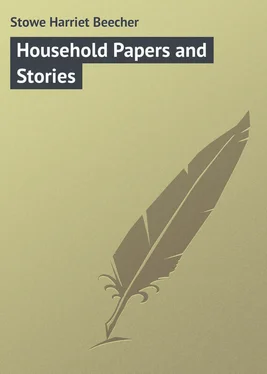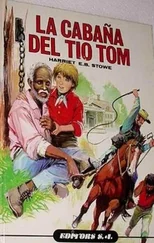Harriet Stowe - Household Papers and Stories
Здесь есть возможность читать онлайн «Harriet Stowe - Household Papers and Stories» — ознакомительный отрывок электронной книги совершенно бесплатно, а после прочтения отрывка купить полную версию. В некоторых случаях можно слушать аудио, скачать через торрент в формате fb2 и присутствует краткое содержание. Жанр: foreign_prose, на английском языке. Описание произведения, (предисловие) а так же отзывы посетителей доступны на портале библиотеки ЛибКат.
- Название:Household Papers and Stories
- Автор:
- Жанр:
- Год:неизвестен
- ISBN:нет данных
- Рейтинг книги:3 / 5. Голосов: 1
-
Избранное:Добавить в избранное
- Отзывы:
-
Ваша оценка:
- 60
- 1
- 2
- 3
- 4
- 5
Household Papers and Stories: краткое содержание, описание и аннотация
Предлагаем к чтению аннотацию, описание, краткое содержание или предисловие (зависит от того, что написал сам автор книги «Household Papers and Stories»). Если вы не нашли необходимую информацию о книге — напишите в комментариях, мы постараемся отыскать её.
Household Papers and Stories — читать онлайн ознакомительный отрывок
Ниже представлен текст книги, разбитый по страницам. Система сохранения места последней прочитанной страницы, позволяет с удобством читать онлайн бесплатно книгу «Household Papers and Stories», без необходимости каждый раз заново искать на чём Вы остановились. Поставьте закладку, и сможете в любой момент перейти на страницу, на которой закончили чтение.
Интервал:
Закладка:
But to return to my subject.
“Finally and lastly,” I said, “in my analysis and explication of the agreeableness of those same parlors, comes the growing grace, – their homeliness . By ‘homeliness’ I mean not ugliness, as the word is apt to be used, but the air that is given to a room by being really at home in it. Not the most skillful arrangement can impart this charm.
“It is said that a king of France once remarked, ‘My son, you must seem to love your people.’
“‘Father, how shall I seem to love them?’
“‘My son, you must love them.’
“So, to make rooms seem home-like, you must be at home in them. Human light and warmth are so wanting in some rooms, it is so evident that they are never used, that you can never be at ease there. In vain the housemaid is taught to wheel the sofa and turn chair toward chair; in vain it is attempted to imitate a negligent arrangement of the centre-table.
“Books that have really been read and laid down, chairs that have really been moved here and there in the animation of social contact, have a sort of human vitality in them; and a room in which people really live and enjoy is as different from a shut-up apartment as a live woman from a wax image.
“Even rooms furnished without taste often become charming from this one grace, that they seem to let you into the home life and home current. You seem to understand in a moment that you are taken into the family, and are moving in its inner circles, and not revolving at a distance in some outer court of the gentiles.
“How many people do we call on from year to year and know no more of their feelings, habits, tastes, family ideas and ways, than if they lived in Kamtschatka! And why? Because the room which they call a front parlor is made expressly so that you never shall know. They sit in a back room, – work, talk, read, perhaps. After the servant has let you in and opened a crack of the shutters, and while you sit waiting for them to change their dress and come in, you speculate as to what they may be doing. From some distant region, the laugh of a child, the song of a canary-bird reaches you, and then a door claps hastily to. Do they love plants? Do they write letters, sew, embroider, crochet? Do they ever romp and frolic? What books do they read? Do they sketch or paint? Of all these possibilities the mute and muffled room says nothing. A sofa and six chairs, two ottomans fresh from the upholsterer’s, a Brussels carpet, a centre-table with four gilt Books of Beauty on it, a mantel-clock from Paris, and two bronze vases, – all those tell you only in frigid tones, ‘This is the best room,’ – only that, and nothing more, – and soon she trips in in her best clothes, and apologizes for keeping you waiting, asks how your mother is, and you remark that it is a pleasant day, and thus the acquaintance progresses from year to year. One hour in the back room, where the plants and canary-bird and children are, might have made you fast friends for life; but, little as it is, you care no more for them than for the gilt clock on the mantel.
“And now, girls,” said I, pulling a paper out of my pocket, “you must know that your father is getting to be famous by means of these ‘House and Home Papers.’ Here is a letter I have just received: —
“Most Excellent Mr. Crowfield, – Your thoughts have lighted into our family circle and echoed from our fireside. We all feel the force of them, and are delighted with the felicity of your treatment of the topic you have chosen. You have taken hold of a subject that lies deep in our hearts, in a genial, temperate, and convincing spirit. All must acknowledge the power of your sentiments upon their imaginations; if they could only trust to them in actual life! There is the rub.
“Omitting further upon these points, there is a special feature of your articles upon which we wish to address you. You seem as yet (we do not know, of course, what you may hereafter do) to speak only of homes whose conduct depends upon the help of servants. Now your principles apply, as some of us well conceive, to nearly all classes of society; yet most people, to take an impressive hint, must have their portraits drawn out more exactly. We therefore hope that you will give a reasonable share of your attention to us who do not employ servants, so that you may ease us of some of our burdens, which, in spite of common sense, we dare not throw off. For instance, we have company, – a friend from afar (perhaps wealthy), or a minister, or some other man of note. What do we do? Sit down and receive our visitor with all good will and the freedom of a home? No; we (the lady of the house) flutter about to clear up things, apologizing about this, that, and the other condition of unpreparedness, and, having settled the visitor in the parlor, set about marshaling the elements of a grand dinner or supper, such as no person but a gourmand wants to sit down to, when at home and comfortable; and in getting up this meal, clearing away and washing the dishes, we use up a good half of the time which our guest spends with us. We have spread ourselves, and shown him what we could do; but what a paltry, heart-sickening achievement! Now, good Mr. Crowfield, thou friend of the robbed and despairing, wilt thou not descend into our purgatorial circle, and tell the world what thou hast seen there of doleful remembrance? Tell us how we, who must do and desire to do our own work, can show forth in our homes a homely yet genial hospitality, and entertain our guests without making a fuss and hurlyburly, and seeming to be anxious for their sake about many things, and spending too much time getting meals, as if eating were the chief social pleasure. Won’t you do this, Mr. Crowfield?
“Yours beseechingly, “R. H. A.”“That’s a good letter,” said Jenny.
“To be sure it is,” said I.
“And shall you answer it, papa?”
“In the very next ‘Atlantic,’ you may be sure I shall. The class that do their own work are the strongest, the most numerous, and, taking one thing with another, quite as well cultivated a class as any other. They are the anomaly of our country, – the distinctive feature of the new society that we are building up here; and, if we are to accomplish our national destiny, that class must increase rather than diminish. I shall certainly do my best to answer the very sensible and pregnant questions of that letter.”
Here Marianne shivered and drew up a shawl, and Jenny gaped; my wife folded up the garment in which she had set the last stitch, and the clock struck twelve.
Bob gave a low whistle. “Who knew it was so late?”
“We have talked the fire fairly out,” said Jenny.
VI
THE LADY WHO DOES HER OWN WORK
“My dear Chris,” said my wife, “isn’t it time to be writing the next ‘House and Home Paper’?”
I was lying back in my study-chair, with my heels luxuriously propped on an ottoman, reading for the two-hundredth time Hawthorne’s “Mosses from an Old Manse,” or his “Twice-Told Tales,” I forget which, – I only know that these books constitute my cloud-land, where I love to sail away in dreamy quietude, forgetting the war, the price of coal and flour, the rates of exchange, and the rise and fall of gold. What do all these things matter, as seen from those enchanted gardens in Padua where the weird Rappaccini tends his enchanted plants, and his gorgeous daughter fills us with the light and magic of her presence, and saddens us with the shadowy allegoric mystery of her preternatural destiny? But my wife represents the positive forces of time, place, and number in our family, and, having also a chronological head, she knows the day of the month, and therefore gently reminded me that by inevitable dates the time drew near for preparing my – which is it, now, May or June number?
Читать дальшеИнтервал:
Закладка:
Похожие книги на «Household Papers and Stories»
Представляем Вашему вниманию похожие книги на «Household Papers and Stories» списком для выбора. Мы отобрали схожую по названию и смыслу литературу в надежде предоставить читателям больше вариантов отыскать новые, интересные, ещё непрочитанные произведения.
Обсуждение, отзывы о книге «Household Papers and Stories» и просто собственные мнения читателей. Оставьте ваши комментарии, напишите, что Вы думаете о произведении, его смысле или главных героях. Укажите что конкретно понравилось, а что нет, и почему Вы так считаете.












